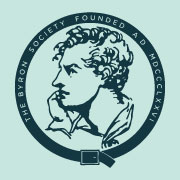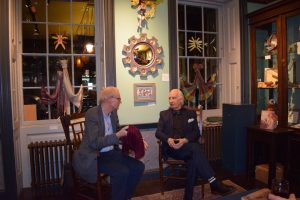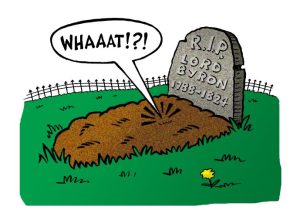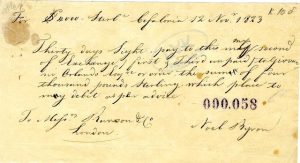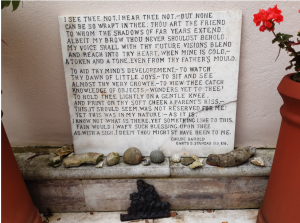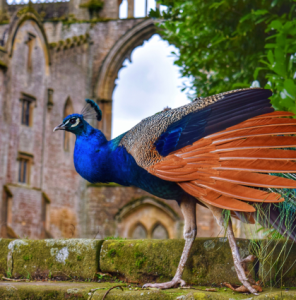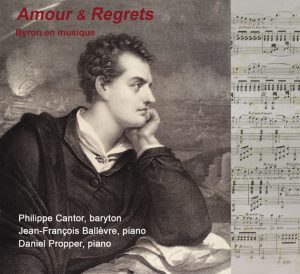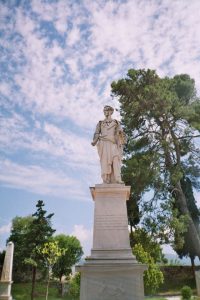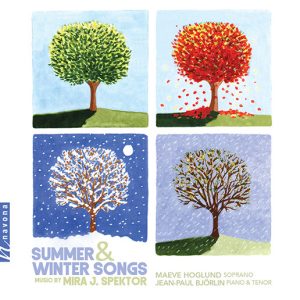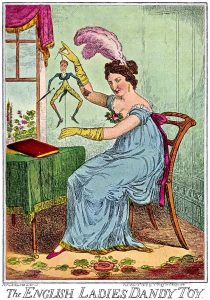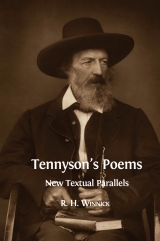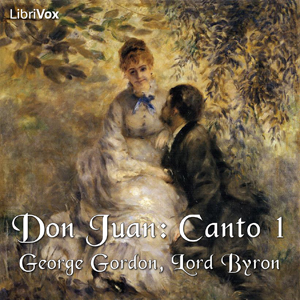Welcome to our Byron Blog. Here you will find lively and engaging explorations of all things Byron, from fresh academic perspectives on key aspects of his literature and life, to modern responses to this most celebrated of poets, rebels and lovers.
To get involved, contact us on Twitter @Byron_Society or email contact@thebyronsociety.com.
Reading Byron
Marc Gotthard, 5th February, 2023
[ezcol_2third_end]Bernard Beatty is proof that one can read Byron for six decades without once being bored, as he says. For someone who has barely started on his lifelong journey with Byron, it is a special pleasure to hold the outcome of a lifetime of close and careful attention, Bernard’s new book Reading Byron, in my hands…….
Un Viaggio del Cuore—A Journey of the Heart
By Marty Ambrose
6th April 2022
[ezcol_1third] 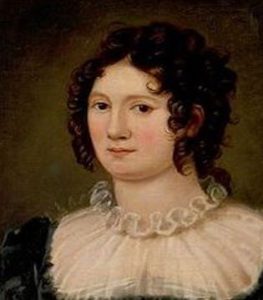 [/ezcol_1third]
[/ezcol_1third]
[ezcol_2third_end]
Claire Clairmont. Stepsister of Mary Shelley. Mistress of Lord Byron. The almost-famous member of the Byron/Shelley circle.
I had always been mildly interested in her as a scholar but, also, so influenced by Byron’s offhand comment in a letter about Claire as “that odd-headed girl”; and Mary Shelley’s thinly-disguised annoyance with her stepsister’s constant presence in her life with Shelley (often tinged with jealousy)….
The Vampyre as a literary war on the image of Greece
By Konstantina Tortomani
9th January 2022
This blog post is based on a paper given at the 2021 International Byron Conference, which won the Byron Society Student Paper Award. The paper explores the first vampire Gothic novel, John William Polidori’s The Vampyre: A Tale (1819) as a form of a response regarding the image of Greece in Byron’s early works, and especially in “The Giaour” (1813) and “Fragment of a Novel” (1819).

Strictest Adultery: Byron’s Italian Loves
By Emily Paterson Morgan, Gavin Roberts, Amanda Pitt and Helen Semple
22nd July 2021
[ezcol_2third_end]From catfights and arson to high society parties and attempted murder, this event offers an intimate insight into Byron’s Italian love life, told in his own words and introduced by Dr Emily Paterson Morgan. Sopranos Amanda Pitt and Helen Semple bring these romantic liaisons and affairs to life in songs, arias as a female response to Byron’s words. ….
Watch here. [/ezcol_2third_end]
Byron, walking in beauty, with an indie pop spring in his step
Tess Callaghan, 30th July 2021
[ezcol_2third_end]Staying in Venice since March, singer songwriter Tess Callaghan has come to know some of the places still strongly associated with Byron to this day, along the Gran Canale, the swimming area in Lido, the Armenian monastery on the Island of San Lazzaro, a few of the houses he frequented. It therefore naturally struck Tess as a good location to film a Byron-themed video for her song “He Walks In Beauty”, setting Byron’s exquisite poem to indie pop…
Don Juan Finish’d
A poem by Max Gutman, 20th May 2021
[ezcol_2third_end]Don Juan Finish’d is a fanciful completion of Lord Byron’s comic epic Don Juan. Its first ten stanzas introduce the project, make sure the reader knows how Byron pronounced “Juan,” and prepare for a quick summary of Byron’s poem. The epigraph comes from Byron: “Nothing so difficult as a beginning/In poesy, unless perhaps the end”…
Byron‘s £332,000 cheque for Greece
by Dr Christine Kenyon Jones and Professor Roderick Beaton, 29th April 2021
[ezcol_2third_end]Members of the Byron Society have helped to identify an important document demonstrating Byron’s generosity and commitment to Greece in November 1823. The document, discovered by Helena Smith, the newspaper’s Athens Correspondent, in the Greek state archives, appears to be a cheque for Byron’s payment of £4,000 (some £332,000 in today’s money) to representatives of the precarious Provisional Government of Greece in November 1823…
Strange Mystery Flower sing Lord Byron
by Roger Arias, 22nd January 2021
[ezcol_2third_end]It all started during a fascinating trip to northern Italy five years ago, where Roger Arias, a musician based in Ferrol, a port city in Galicia, discovers a mysterious relationship with the poems of William Blake. hose mystical and visionary writings, which revolve around the most intimate and deepest longings of the human being with respect to their role in the world, their relationship and harmony with nature, as well as some brushstrokes of social criticism not without a certain sharpness, awaken the musician’s desire to compose melodies and sing them….
The ‘superannuated Jesuit’ – Byron’s worst portrait?
By Christine Kenyon Jones, 21st October 2020
[ezcol_2third_end] In his early days of fame, around 1813-15, Byron was super-pernickety about his portraits and hoped to be able to control the way he was portrayed by artists such as Thomas Phillips. ‘No ‘pens and books on the canvas’, he decreed, while going so far as to destroy the plate of one of the engravings of this picture which he disliked. By 1821 he had become more resigned to his inability to regulate the way he was visually portrayed, and he was flattered by a request to sculpt him from the distinguished Florentine sculptor Lorenzo Bartolini, who had been a favourite of Napoleon…
The Mystery of Allegra’s Monument
By Hanna Barbara Coltman, 17th July 2020
[ezcol_2third_end]A couple of months ago, as the Covid 19 lock- down took its toll, I found myself spending more time in the garden and came across the damaged slab. Cleaned of its moss coating and splashes of concrete from careless builders, I was able to pick out the lettering, which revealed the two stanzas 115 and 116 from Canto 3 of Childe Harold. ….
Locking down with Byron (and a few others)
By Jennifer and Rebecca Douglas, 29th May 2020
[ezcol_2third_end] When in mid -March the BBC Six o’clock News on Radio 4 suddenly chose to finish each bulletin with “something uplifting”, you knew that, in the words of Noel Coward ,“There Are Bad Times Just Around the Corner”. Of immediate concern was that quite a few of my neighbours and friends had already started to self -isolate before lockdown became official. Many were on their own and the prospect of them remaining on their own for up to three months was rather alarming.
Byron’s Spirit at Newstead
[ezcol_2third_end]A poem by Janet Gell Thompson. The Byron Society are always particularly thrilled to see how Byron’s life and works, the objects he left behind, inspire modern writers, artists and musicians. And here we have an excellent example of how strong the spirit of Byron and Byronism remains in the twenty-first century.
Old abbey walls
were calling
the day you startled me
your garden gleamed…
Byron, a long journey
[ezcol_1third]
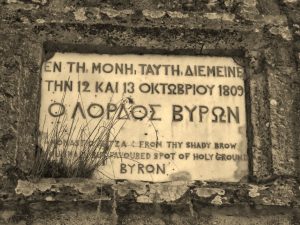
[/ezcol_1third]
[ezcol_2third_end]
Byron’s spirit and influence follow us around, even when we’re not consciously walking in his footsteps. At my school, Shelley’s poetry was on the ‘A’ level English syllabus (even though much of his poetry had been trashed by F.R. Leavis). Lord Byron didn’t get a look-in. At university I discovered Don Juan, which made a delightful change from Paradise Lost, the Aeneid and Beowulf. It wasn’t until I was posted to Greece in 1980 that I became conscious of how central Byron’s work…
Amour and Regrets
[ezcol_2third_end]
A CD of music based on Byron’s works from a concert given at the Institut Hongrois on the 6th of July 2016 during the International Byron Conference in Paris. This recording aims to give a glimpse of the richness and variety of Byron’s work as a source of musical inspiration, from the very beginning of its reception in France to its post-Romantic days of glory in central Europe at the end of the century.
Unity and Fragmentation of the Speaking Past: Representations of the Classical Voice in Byron, Seferis, and Capetanakis
[ezcol_2third_end]
Byron’s “The Isles of Greece”, an ode inserted within the larger framework of Byron’s Don Juan (1819-1824), is famously and widely considered an hymn to the liberation of the Greek state from Ottoman occupation. As an inspirational song of freedom and independence, “The Isles of Greece” calls onto the Greek ancient and classical past in order to inspire the revolution. Starting from this use of the classics as a source of nationalist pride and revolution, I will compare Byron’s portrayal of the ancient past…
[/ezcol_2third_end]
The Lord Poet
[ezcol_2third_end]
An Interview with Megan Franks.
I have always been fascinated with society and morality and what makes those rules effective. When I researched Byron, I found him to be an anomaly, in that he seemed to follow his own moral compass. This isn’t an unusual characteristic per se, except in the instance that his lack of adherence to rules seemed to stem from his broader perception of the world vs. a genuine dislike for authority or something of the like.
Comic Method in Byron’s Don Juan
[ezcol_1third]  [/ezcol_1third]
[/ezcol_1third]
[ezcol_2third_end]
I want to conclude this series on the ‘mobility’ of Bryon’s comic performance in Don Juan with a slightly longer post (apologies!). I think there’s an aspect of Byron’s art that his most severe critics seem to have missed although, to me, it seems obvious. In brief, Byron may be a contemporary of the great English Romantic poets (Wordsworth, Keats, Coleridge) but he shares little of their interest in introspective reflection on metaphysics or psychology. As W.H. Auden argued in the Introduction to his 1966 Selected Poetry and Prose of Byron, Byron is a ‘realist’ and not a ‘romantic’.
First the Words:
Holocaust survivor, poet, and composer Mira J. Spektor on Lord Byron
[ezcol_1half_end]
Performed by soprano Maeve Höglund, Mira J. Spektor’s new album SUMMER & WINTER SONGS glides through stories of love and loss. With songs set to texts by herself, Goethe, Byron, and a selection of poetry by her granddaughter Lily Nussbaum, Spektor’s songs are as lyrical as they are profound. The richly melodic work is alive with images of falling into slumber as summer fades to fall, bitter winter chills within the heart of one whose lover is far away, passionate romance …
[/ezcol_1half_end]
Doubt & Murder: Cain’s Humanistic Liberation
[ezcol_1third]
[/ezcol_1third]
[ezcol_2third_end]
Lord Byron produced Cain when “a wave of blasphemy prosecutions [had] swept through England”. As a controversial response to such a crisis, Byron dramatically revised the myth of Cain and shaped the first human murderer as a rebellious hero pursuing knowledge and the truth of life with great revolutionary passion against rigid religious control on free thoughts. After Cain had been published, Walter Scott thought it made Byron “certainly matched Milton on his own ground”.
The Comic Role of “Byron”
[ezcol_2third_end]
If there were such a competition, I would vote for Don Juan as the greatest comic poem in English. But some distinguished critics consider Byron a psychological light-weight; someone who won’t face up to (either) his internal turmoil and feelings of culpability (or, alternately) his inner ‘hollowness’ by which is meant, I guess, a lack of insight. That diminishes his fame, they say. I referred, last time, to Mathew Arnold, who esteemed Byron but who agreed with a remark of Goethe (not made about Don Juan, however): “the moment he begins to reflect; he is a child…”
[/ezcol_2third_end]
Comic Mobility in Don Juan
[ezcol_1third] 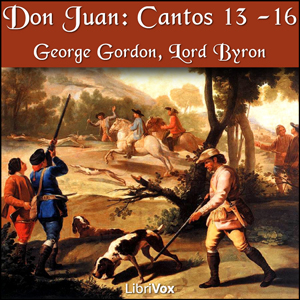 [/ezcol_1third]
[/ezcol_1third]
[ezcol_2third_end]20th May 2019
Reading aloud, or listening to the poem, works well for Don Juan for two reasons. First, it’s a personal statement. The narrative, when there is one, never much conceals the narrator and, where there’s any danger it might, Byron steps forward to direct our attention back to himself in an aside or with a clever rhetorical trope. Voice is the poem’s medium, rather than meditation…
A Literary Odd Couple
[ezcol_2third_end]2nd May 2019
Few poets in the pantheon of British literature are as un-Byronic as the dour, proper, sometimes oppressively high-minded laureate Alfred Lord Tennyson. So among the many (I hope pleasant) surprises in my new Tennyson study, Tennyson’s Poems: New Textual Parallels, from Open Book Publishers, are the thirty-plus instances in which phrases of as few as two or three and as many as several words in Byron poems turn up verbatim or very nearly so in poems of Tennyson.
Narrating Byron’s Amatory Epic
[ezcol_2third_end] 29th April 2019
I’m preparing to publish (“free”) an annotated and narrated edition of Cantos I & II of Byron’s Don Juan on the bicentenary of their first London publication this July. But “why narration”? Aren’t there already several readings? Do we need another?
Don Juan: Sense From Sound
[ezcol_1quarter]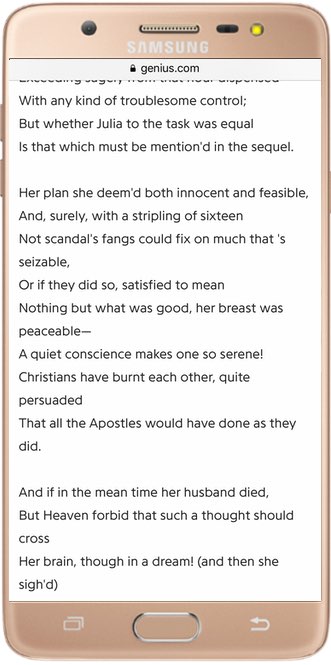 [/ezcol_1quarter]
[/ezcol_1quarter]
[ezcol_3quarter_end]15th April 2019
The way people read these days poses challenges for the publisher of poetry as I explained last time. It’s hard to show the verse of Don Juan’s verse in unbroken lines across the narrow confines of a phone screen. Unless, you choose a font size so small that it’s hard to read anyway….
Don Juan: Who needs it, who reads it?
[ezcol_1third]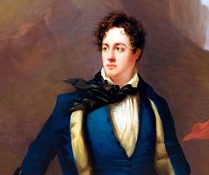 [/ezcol_1third]
[/ezcol_1third]
[ezcol_2third_end]1st April 2019
As the greatest comic poem in the language, Don Juan should have a much wider audience among English-speakers everywhere.That’s more than a billion people who could be happier, wiser and… yes, wealthier (if you believe Byron….
Don Juan: The Greatest Comic Poem in English
[ezcol_1third]
[/ezcol_1third]
[ezcol_2third_end] 16th March 2019
Germaine Greer once observed that Don Juan is the greatest comic poem in English. It should be as popular, she thought, as Ariosto’s Orlando Furioso in Italy or, for that matter, Pushkin’s Eugene Onegin in Russia. True, in my view![/ezcol_2third_end]

[ezcol_1third] [/ezcol_1third]
[/ezcol_1third]
[ezcol_2third_end] 12th February 2019
“And again”, boomed Simon Russell Beale, as he deftly propelled the pianist and Lord Byron downstage to take another bow… This was October 2018, at Cadogan Hall; Byron Angel & Outcast was my fifth dramatised concert. The proceeds were directed to Dr Vincent Khoo’s research at the Royal Marsden into advanced prostate cancer. The full story began two years before. [/ezcol_2third_end]

Streaming Byron As a Musical Story
[ezcol_1third]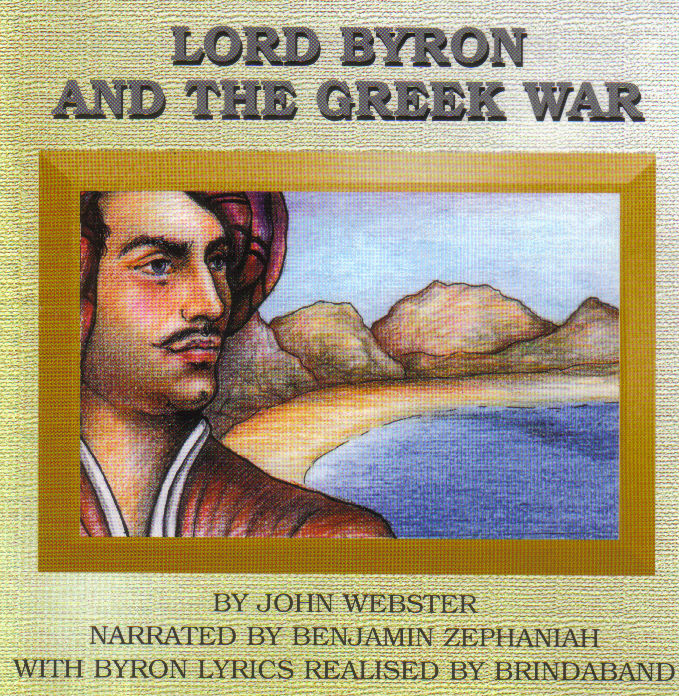 [/ezcol_1third]
[/ezcol_1third]
[ezcol_2third_end]
6th February 2019
Musician John Webster discusses his transformation of Byron’s experiences during the Greek War into a musical showpiece narrated by Benjamin Zephaniah.
Three Musical Settings of Byron Love Poems
[ezcol_1third]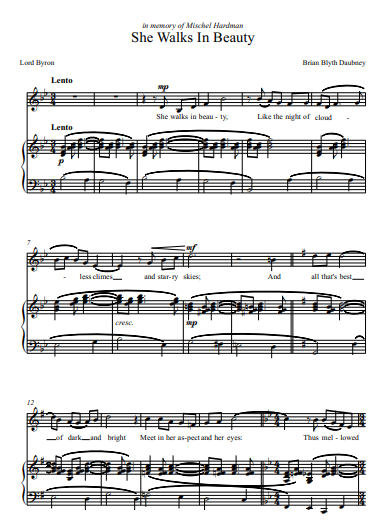 [/ezcol_1third]
[/ezcol_1third]
[ezcol_2third_end] 14th August 2018
Composer Brian Daubney describes the inspiration he finds in Byron’s poetry, and the circumstances which led to him composing three musical settings for Byron’s ‘She Walks in Beauty’, ‘When we Two Parted’ and ‘So We’ll No More Go A-Roving’. The music is available to listen to in the blog, along with the musical scores.
[ezcol_1third]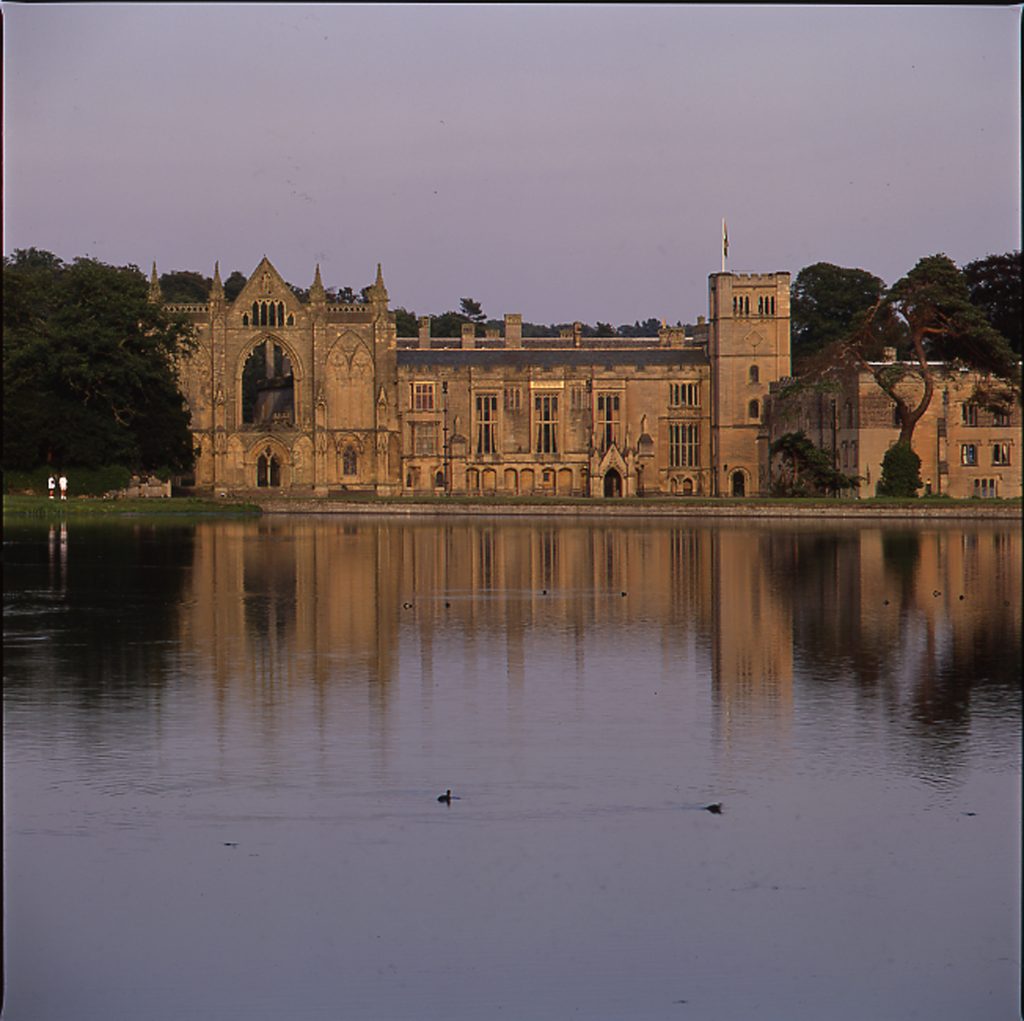 [/ezcol_1third]
[/ezcol_1third]
[ezcol_2third_end]15th May, 2018
Some months ago, the Byron Society received a beautiful poem from Janet Gell-Thompson. This work vividly captures the strength of Byron’s legacy, which is not restricted to libraries and lecture halls but lives and breathes in the stones of Newstead Abbey…
[ezcol_1third] 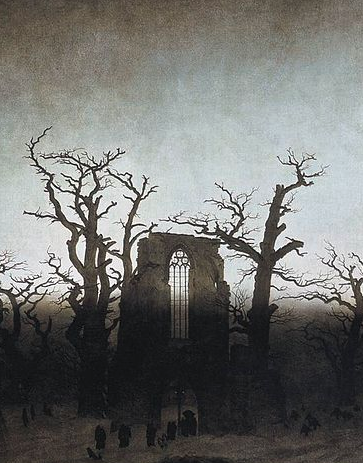 [/ezcol_1third]
[/ezcol_1third]
[ezcol_2third_end] 15th March, 2018
Stephen Minta
We begin a long way from Lord Byron. In fact, at the very dawn of European literary culture. I’m going to start with a brief passage from Homer’s Iliad, book 3. Helen, she of Troy, has just been looking from the battlements at the vast army of the Greeks below her on the Trojan plain […]
If you would like to contribute to All Things Byron, contact us on Twitter @Byron_Society or email contact@thebyronsociety.com.
